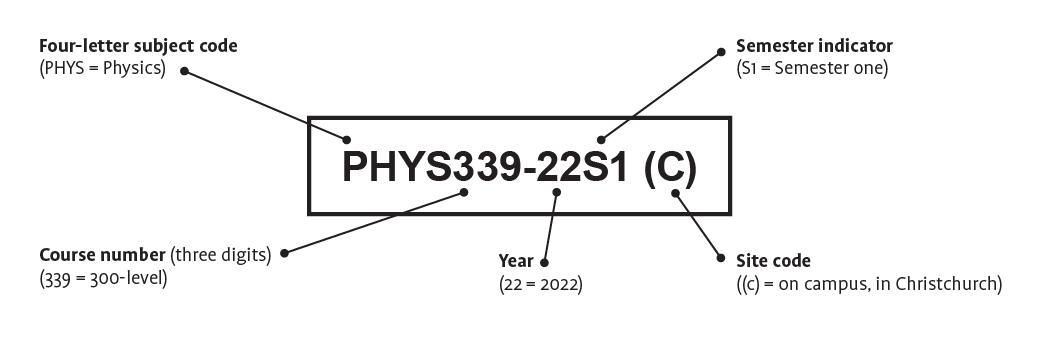I
Indigenous Narrative – TITO
Information Systems - INFO
Innovation - INOV
International Law and Politics - ILAP
J
Japanese - JAPA
Journalism - JOUR
L
Law - LAWS/LLAW
Linguistics - LING
M
Management - MGMT
Māori and Indigenous Leadership - TIRA
Māori and Indigenous Studies - MAOR
Māori Innovation - MINN
Marketing - MKTG
Mātauranga Māori - AKOM
Mathematical Physics - MAPH
Mathematics - MATH
Mathematics and Philosophy - MPHI
Mechanical Engineering - ENME
Mechatronics Engineering - ENMT
Media and Communication - COMS
Medical Physics - MDPH
Medical Physics (Clinical) - MPHC
Microbiology - MBIO
Moving Image - MOVI
Music - MUSA/MUSI
N
Natural Resources Engineering - ENNR/ENCN
Nursing - NURS
P
Pacific Studies - PACS
Painting - PAIN
Philosophy - PHIL
Photography - PHOT
Physics - PHYS
Political Science and International Relations - POLS
Primary Teaching - AKOP
Printmaking - PRIN
Professional and Community Engagement - PACE
Professional Accounting - MPAC/MBAZ
Product Design - PROD
Psychology - PSYC
R
Russian - RUSS
S
Science - SCIE
Science Education - SCED
Science, Māori and Indigenous Knowledge - SCIM
Sculpture - SCUL
Social and Environmental Sustainability - SENS
Social Work - SOWK
Sociology - SOCI
Software Engineering - SENG
Soil Science - SOIL
Spanish - SPAN
Speech and Language Pathology - CMDS/SPSC
Sport Coaching - SPCO
Sport Science - SSCI
Statistics - STAT
T
Taxation - TAXA
Teacher Education - TE**/AKOT/AKOA
Te Reo Māori - TREO
Te Whare Pūrākau - TAKI
Translation and Interpreting - TRIN
Transportation Engineering - ENTR
W
Water Resource Management / Water Science and Management - WATR
Writing - WRIT
Y
Youth and Community Leadership - YACL

